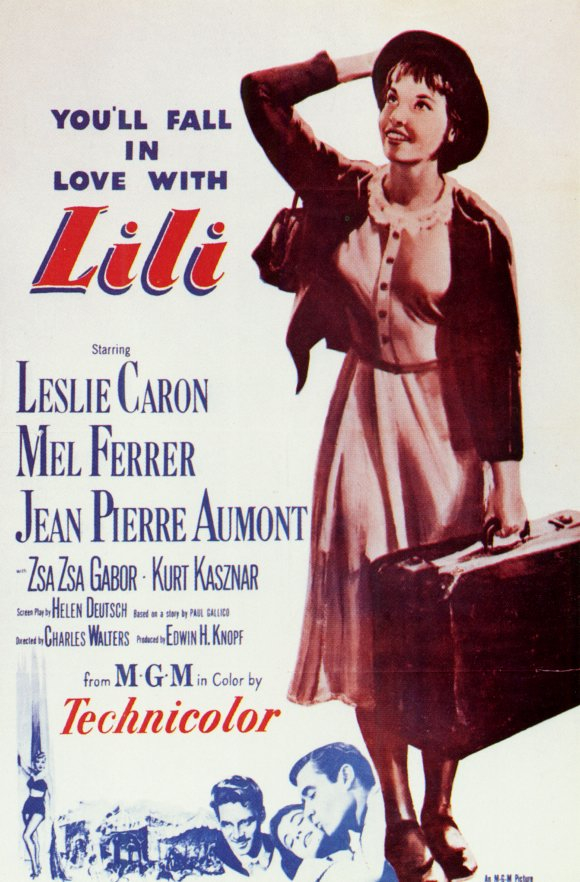 We move from Italy to France with our third selection of the year, the musical comedy-drama Lili (1953). It’s an MGM musical, filmed at the California studio, but it certainly seems like France. Parisian-influenced films were certainly popular at the time, what with titles like An American in Paris, On the Riviera, Scaramouche, April in Paris, Moulin Rouge, Paris Model, Little Boy Lost, Cyrano de Bergerac, The French Line, Assignment – Paris and others filling screens in the early 1950s. MGM decided to try to capitalize on the huge success of An American in Paris by staging another French-based musical with its elfin star, Leslie Caron, and the result is Lili, a film I personally feel is considerably superior to the 1951 Best Picture Oscar winner.
We move from Italy to France with our third selection of the year, the musical comedy-drama Lili (1953). It’s an MGM musical, filmed at the California studio, but it certainly seems like France. Parisian-influenced films were certainly popular at the time, what with titles like An American in Paris, On the Riviera, Scaramouche, April in Paris, Moulin Rouge, Paris Model, Little Boy Lost, Cyrano de Bergerac, The French Line, Assignment – Paris and others filling screens in the early 1950s. MGM decided to try to capitalize on the huge success of An American in Paris by staging another French-based musical with its elfin star, Leslie Caron, and the result is Lili, a film I personally feel is considerably superior to the 1951 Best Picture Oscar winner.
Following An American in Paris nobody knew what to do with Leslie Caron. She was cast in a an odd Victorian-era thriller, The Man with a Cloak, then as a hoochie dancer in the awful melodrama Glory Alley, and finally as part of one of the couples in The Story of Three Loves. It wasn’t until Lili that she appeared in another musical, which became her forté for the decade; later triumphs would include The Glass Slipper, Daddy Long Legs and, of course, Gigi. Caron was certainly pretty and appealing, but nobody was quite sure what she could do. Lili gave Leslie Caron the opportunity to sing, to dance and to act. It brought her the first of her two Academy Award nominations for Best Actress, and she is utterly charming.
Orphaned teenager Lili Daurier (Caron) arrives in a French town hoping to land a job with a family friend. When that fails, she attaches herself to a kindly magician, Marc (Jean-Pierre Aumont), whose amorous ideas are tempered by her young age. Marc gets her a job at the carnival, but that doesn’t work out either. Despondent, Lili is saved from dire consequences by the voice of a puppet named Carrot-Top and a few of his friends. Dialogue is established between Lili and the puppets, the carnival people are enthralled, and before long Lili is part of the puppeteer’s act.
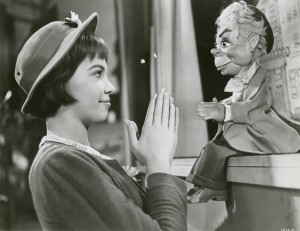
Lili thinks of the puppeteer Paul (Mel Ferrer) as “the angry man” because the former dancer with the lame leg is always short-tempered with her. She doesn’t connect the angry Paul behind the curtain with his kindly puppets in front of the curtain, and cannot fathom that Paul is falling in love with her because of her purity. Lili’s innocence, the way she reacts to the puppets, is what makes the act work. Not only is it charming, but Caron makes Lili’s reactions absolutely convincing; she is fully invested in the performance. It is the first meeting between Lili and the puppets that seals the deal. With no future in sight, Lili is distracted by the puppet Carrot-Top, who makes her forget about her misery for a few minutes. Lili’s honest reaction to Carrot-Top and his friends Marguerite, Reynaldo and Henry the Giant is utterly believable and irresistibly charming. Lili’s naiveté is obvious to everyone, yet the innocence she projects is so believable that no one in the story attempts to interfere with it. Indeed, Paul’s act gains immeasurably with Lili’s participation with the puppets, creating conversations and interacting with them as though they were real people.
The puppets themselves are worth mentioning. I’m not a fan of puppetry, having had nightmares about puppets as a child and having seen the terrific Magic when I was still impressionable. Yet these puppets, and the manner in which they are voiced, are different. Each puppet, like the brain characters in the new Pixar film Inside Out, represents specific emotions or personality traits. Marguerite is vain; Reynaldo is sneaky and untruthful; Henry is simple and honest; Carrot-Top is sensitive and lonely. Of course together, as encompassed by the man behind the curtain who moves them around and speaks for all of them, is one entire human being — collectively they represent Paul (and, of course, every other person).
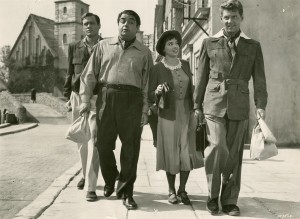
Lili is essentially adopted by Paul and his partner Jacquot (Kurt Kasznar) to keep the act going, but Lili’s romantic feelings for Marc are overpowering. Those feelings make Paul angry because he knows that Marc is a cad. But even Marc sees that Lili is pure, and he is loathe to take advantage of her until he can exit gracefully without having to deal with the aftermath. It is Lili’s burgeoning womanhood that adds an unexpected dimension to the film. Just sixteen, Lili is a woman in the physical sense, but not yet in the psychological sense. She wants to be; she imagines herself in a sexy dance with Marc, competing with his assistant (and unknown to Lili, wife) Rosalie (Zsa Zsa Gabor) for his affections. She just about throws herself at Marc more than once, but it seems that even he knows that when Lili loses her innocence, something very rare and precious will die. The raw sexuality of the piece is only overt when Rosalie is on screen, losing her costume on stage, yet it is implied all over the place.
When Lili first arrives in this unidentified small town, the first person she meets, the shop keeper, is nice to her until she resists his unwelcome romantic advances. She is rescued by Marc’s interruption, yet he prefers the long legged woman outside, known only as Peach Lips (Amanda Blake). Rosalie is Marc’s assistant, yet much of her role on stage consists of having her clothes ripped off. This occurs, too, in the imagined dance sequence with Lili and Marc. Even the puppet Reynaldo, the wolf, is full of sexual innuendo, of which Lili remains blissfully unaware (“I thought he was a fox,” she says, meaning it quite literally). Consider the final dance sequence, when Lili dances with the human versions of the puppets. Each of them kisses her and turn into Paul; that’s when she realizes she really loves him instead of Marc. The crux of the movie centers on Lili’s innocence; it is only a matter of time until she loses it — what will happen then?
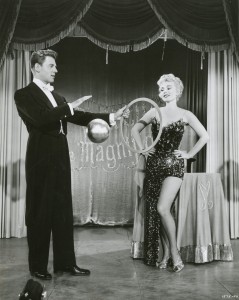
Lil’s sexual coming-of-age is not at all superfluous to the story; it is all about her uncertain steps to womanhood — and the efforts of her friends to protect her from heartbreak — that deepen the drama to a universal level. Rosalie is jaded — she warns Lili that Marc is her man and will continue to be, even if he trifles with her. Rosalie does not care a whit about Lili; she just wants to protect her claim on Marc. But all the men want to protect Lili for as long as they can, even while realizing that it is in Marc’s nature to eventually take advantage of the young blossoming woman who adores him. Paul even offends her with his harshness, trying to tell her about Marc without spelling things out. But eventually Lili finds his wedding ring and realizes the situation on her own. Being an honorable woman she returns the ring to him, says goodbye and leaves the carnival with no intention of returning. The romantic feelings that Marc has stirred within her are more powerful than she expects, however. On the long walk out of town Lili daydreams again about the puppets she loves, and finally realizes that it is Paul who loves her, and she him. And then she does the only thing she can do, which is to return to the people who love her.
This is pretty heavy dramatic stuff, but it is leavened with comedy and music and an abundance of charm. Interacting with the puppets presents Lili’s childlike innocence; together they sing an amusing, catchy song called “Hi-Lili, Hi-Lo”. Lili is entranced by Marc’s magic act, the dog act, even the dancing girls. For the first time in her rather provincial life Lili is surrounded by bright, exciting colors, sounds and events, and people who take all of those things for granted. She doesn’t know how to respond to any of it, except to gravitate toward the man who treats her with kindness, Marc.
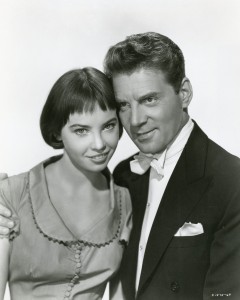
Marc is the alpha male of the carnival, and it is he who dominates the film’s first half, as he reluctantly takes Lili under his wing and procures a job for her. But the film slowly switches its focus to Paul, the former dancer who has turned to puppetry out of need, and who just as reluctantly accepts guardianship of Lili from Marc. It is Paul who saves Lili, even as she continues to pine for Marc, and it is he who devotes himself and his act to her, though she is completely unaware of that. A comparison of the two men is inevitable for both Lili and the audience, and while Marc makes a strong first impression, it is Paul, the angry man, whose gruffness masks deep feelings for the young woman. Lili brings out the best of Paul, drawing out his most tender feelings and gentility. The puppet act works because the puppets, representing Paul’s personality, finally have something to play against. I find it fascinating that the film has so much to say about male maturity and worth by constructing this comparison. The third man, Jacquot, Paul’s partner, is never a romantic interest for Lili; he serves as Paul’s conscience in many scenes and as a sort of Greek chorus in others. As much as the story is about the impending loss of Lili’s innocence, it is also about how each man handles his role in regard to her evolution. Marc could be a total cad, but he isn’t. Paul could be far more greedy and heartless, but he isn’t. Each man responds to Lili in tender ways, and the purer love of Paul’s is what finally wins her affection.
It should be evident by now that this is not a children’s film. While the puppetry and music are charming enough to entertain a young audience, there are all sorts of very serious undercurrents flowing throughout the story. That, for me, is why this movie is so effective, and so valuable. Sure, it’s cute and all, but it’s tremendously mature as well. Just look at that final dance sequence, when Lili is walking away from town and imagines that she is dancing with the puppets she loves. Suddenly they are all human-sized, traveling along with her, and each takes a turn dancing with her. One by one they all turn into Paul and kiss her, then run back toward town. One doesn’t need to be Sigmund Freud to understand that she is finally connecting each puppet’s perceived love for her with that of Paul, the man behind the curtain. And then Lili does the mature thing and returns to him. It’s a perfect ending.
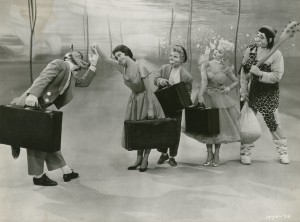
Lili was a popular MGM musical that benefitted from the particular gloss of that studio, not to mention the charm of its stars and that catchy song. It earned six Academy Award nominations, including Best Actress and Director (Charles Walters), plus Best Writing, Color Cinematography, Color Art Direction – Set Decoration and Music Scoring. It’s only win was for the music of Bronislau Kaper. Lili also found its way into the list of top ten films of 1953 according to the National Board of Review, was chosen as the Best Written American Musical by the Writers Guild of America, won an International Prize as the best Entertainment Film at the Cannes Film Festival, won a Golden Globe award for Best Screenplay (Helen Deutsch) and won a BAFTA award for Leslie Caron as Best Foreign Actress. It was also nominated for several other awards. Caron lost the Best Actress Oscar to Audrey Hepburn, who charmed audiences in Roman Holiday; Caron would be nominated one other time, in 1963 for a dramatic turn in The L-Shaped Room.
Is Lili a classic? You bet it is. I had not seen this film since high school (our theatre department performed Carnival and I had a small supporting role — which isn’t in the original movie, Lili), so I’ve come back to it relatively fresh. I was expecting a sweet and simple story with pretty music and, oh yeah, puppets. I was not prepared for the depth of writing and performing that this movie presents; it is a profoundly charming and moving film, one of the best of 1953. Helen Deutsch’s screenplay is masterful, while Leslie Caron is perfect in her finest role. ☆ ☆ ☆ 1/2. 1 August 2015.
